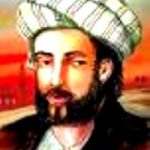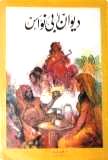Abu-Nawas Hassan-lbn-Hauni-Khuzestani ( 750 - 813 ) was an early Arabic language poet , probably born at Ahwaz in Persia . He was of Persian descent. (see "The Golden Age of Persia", by Richard Nelson Frye , p123, ISBN 0-06-492288-x)
His given name was Hasin ibn Hani al-Hakami , Abu Nuwas being an honorific and pen name . Abu Nuwas is also written as Abu Nowas , Abu Nu'as and Abu Nuwaz , and the poet was nicknamed "Father of Curls" because of his long flowing hair. Due to the protection of powerful patrons, among whom the Barmaki family, enlightened advisors to caliph Harun al-Rashid , Abu Nuwas was able to celebrate wine and the love of youths, pleasures tolerated in Islamic society only when tasted quietly. This tolerance is often presented as an example of the tolerance of the Islamic religion. However, Nuwas was also severely persecuted, had to go into exile for a period of time after the fall of the Barmakis, and allegedly died a violent death in prison.
His commissioned work, the 'mu'annathat', includes poems on the topic of hunting, the love of women, and panegyric s to his patrons. The majority of his work is referred to as 'mudhakkarat' and 'mujuniyyat', and it is addressed to males. There are also two distinct sub-categories of poems: the first about young girls who disguise themeselves as boys, the 'ghulamiyyat'; and the second wine & drinking songs, the 'khamriyyat'.
He is generally regarded as one of the greatest of classical Arabic poets , if not the very best. Abu Nuwas has entered the folkloric tradition, and he appears several times in The Book of One Thousand and One Nights .
His freedom of rhetorical expression, and his celebration of transgressive love, continues to excite the animus of censors. In January 2001 the Egyptian Ministry of Culture burned 6,000 books of poetry by Abu Nuwas, after pressure from Islamic fundamentalists.
Abu Nuwas born to an Arab father, a soldier from Damascus whom Nuwas never knew, and a Persian mother, Golban, who worked as a weaver. Biographies differ on the date of Abu Nuwas' birth, ranging from 746 to 760 .
When Abu Nuwas was still a young boy, his mother sold him to an apothecarist from Yemen , Sa’ad al-Yashira, and the young Nawas worked for al-Yashira in his shop at Basra , Iraq . In time Nawas's youthful beauty and intelligence caught the attention of Walibah ibn al-Hubab , a poet noted for his blond hair. al-Hubab bought Nawas's freedom and took him under his wing, mentoring him in studies of theology and grammar, as well as being his lover. Later, Nuwas continued his studies under Khalaf al-Ahmar . Tradition holds he also lived for a year among the Bedouin s to study their linguistics, but found their rugged life too arduous.
Abu Nuwas settled in Baghdad and soon became renowned for his witty and humorous poetry, which dealt not with the traditional desert themes, but with urban life and the joys of wine ( khamriyyat ), loving adolescent boys and young men ( mudhakkarat ), and ribald humor ( mujuniyyat ). "For young boys, the girls I’ve left behind, and for old wine set clear water out of mind," is a typical verse of his. "I delight in what the Book forbids, and flee what is allowed," was another, showing how unashamed Nuwas was about his indulgences. Despite his celebration of the joys of love between males, he was less than sympathetic towards lesbianism , and often mocked what he perceived as its inanity.
Nuwas was forced to flee to Egypt for a time, after he wrote an elegic poem praising the Barmakis , a once politically powerful family which had been crushed and massacred by the caliph, Harun al-Rashid . He returned to the city in 809 upon the death of al-Rashid and the ascension of Muhammad al-Amin , Rashid's twenty-two year old son and a former student of Nuwas. For a time Nuwas enjoyed the patronage of the caliph, but was imprisoned when his drunken exploits tested even al-Amin's patience. Amin was overthrown and killed by his brother, who had even less patience with Nuwas than either Amin or his father. Some accounts claim that fear of prison made Nuwas repent his old ways and become deeply religious, while others believe his later, penitant poems were simply written in hopes of winning the caliph's pardon. Depending on which biography is consulted, Nuwas either died in prison or was poisoned.
Abu Nuwas is considered one of the greats of classic Arabic literature, and his style and subject matter is comparable to the Greek Anacreon . Linguisticlly, Nuwas is noteworthy for being among the first Arab poets to use both Persian and Arabic vernacular in a literary form traditionally used for only classical language. Among later writers he influenced were Omar Khayyám , Hafiz , and Hakim Bey . A hedonistic caricature of Nuwas appears in several of the Thousand and One Arabian Nights tales. Among his best known works are " Wine of Paradise ," " A boy is worth more than a girl ," " Wa-Khaiymati Naturin ," and " O Tribe That Loves Boys ."





